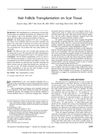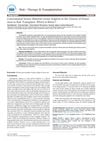 1 citations,
July 2021 in “Aesthetic Plastic Surgery”
1 citations,
July 2021 in “Aesthetic Plastic Surgery” The new triangular flag-shaped design for incisions in hair transplant surgery provides better hair alignment and cosmetic appearance without extra scarring, especially for patients with specific hair directions.
9 citations,
November 2015 in “Plastic and reconstructive surgery/PSEF CD journals” Gene knockout mice developed scars similar to human hypertrophic scars, useful for studying scar progression.

Regenerative cosmetics can improve skin and hair by reducing wrinkles, healing wounds, and promoting hair growth.
[object Object]  2 citations,
March 2019 in “Plastic and Reconstructive Surgery”
2 citations,
March 2019 in “Plastic and Reconstructive Surgery” The letter suggests that a modified fat processing technique may increase regenerative cells but calls for more trials to confirm its effectiveness for skin and hair treatments.
 May 1999 in “Journal of Oral and Maxillofacial Surgery”
May 1999 in “Journal of Oral and Maxillofacial Surgery” The book provides practical guidance on cosmetic facial surgery for clinicians.
 July 2023 in “Journal of Education, Health and Sport”
July 2023 in “Journal of Education, Health and Sport” Fractional microneedle radiofrequency is a safe and effective skin treatment with minimal serious side effects.
 6 citations,
January 2023 in “npj regenerative medicine”
6 citations,
January 2023 in “npj regenerative medicine” Transplanting growing hair follicles into scars can help regenerate and improve scar tissue.
 1 citations,
October 2018 in “Madridge journal of dermatology & research”
1 citations,
October 2018 in “Madridge journal of dermatology & research” A young child with alopecia areata and psoriasis improved with treatment, suggesting a link between the two conditions.
 July 2021 in “Aesthetic Surgery Journal”
July 2021 in “Aesthetic Surgery Journal” Using lasers and fat grafting before hair transplant improves hair growth on scarred skin.
 3 citations,
June 2020 in “Dermatologic Surgery”
3 citations,
June 2020 in “Dermatologic Surgery” Dense-packing follicular unit extraction is a safe and effective way to treat extensive scarring alopecia.
 17 citations,
July 2014 in “Our Dermatology Online”
17 citations,
July 2014 in “Our Dermatology Online” Older adults have a wide range of skin conditions, with dry skin being very common and many also experiencing skin growths, itching, and infections.
 2 citations,
September 2019 in “Dermatologic Surgery”
2 citations,
September 2019 in “Dermatologic Surgery” The two-step procedure of fat grafting followed by hair grafting improves scalp and facial scar correction.
 3 citations,
March 2019 in “Archives of Plastic Surgery”
3 citations,
March 2019 in “Archives of Plastic Surgery” Hair transplantation effectively corrects hairline issues after midface-lifting surgery with high patient and physician satisfaction.
 December 2022 in “Journal of Phytonanotechnology and Pharmaceutical Sciences”
December 2022 in “Journal of Phytonanotechnology and Pharmaceutical Sciences” Ayurvedic treatment helped a woman with PCOS become pregnant and have a healthy baby.
 September 2021 in “PubMed”
September 2021 in “PubMed” Hair transplantation is effective for treating scar-related hair loss on the head and neck.
 1 citations,
January 2001 in “Dermatologic Surgery”
1 citations,
January 2001 in “Dermatologic Surgery” Pulsed dye laser and hydrogel dressings effectively treat hypertrophic scars.
 24 citations,
November 2019 in “Dermatologic Surgery”
24 citations,
November 2019 in “Dermatologic Surgery” Platelet-rich plasma is most effective for hair loss treatment and wound healing in skin surgery, but more research is needed for consistent results.
 16 citations,
November 2019 in “Dermatologic Surgery”
16 citations,
November 2019 in “Dermatologic Surgery” Platelet-rich plasma is most effective for hair loss treatment and shows promise for skin healing and rejuvenation, but more standardized research is needed.
 28 citations,
July 2013 in “Journal of Craniofacial Surgery”
28 citations,
July 2013 in “Journal of Craniofacial Surgery” Hair follicle transplantation can hide scars but often needs more than one surgery for better results.
 December 2017 in “Facial Plastic Surgery”
December 2017 in “Facial Plastic Surgery” The document concludes that successful treatment of upper and midface trauma should focus on restoring both appearance and function, with attention to facial structure, skin, and hair repair.
 6 citations,
July 2017 in “Clinics in Plastic Surgery”
6 citations,
July 2017 in “Clinics in Plastic Surgery” The document concludes that individualized reconstruction plans are essential for improving function and appearance after head and neck burns.
 4 citations,
November 2016 in “Hair transplant forum international”
4 citations,
November 2016 in “Hair transplant forum international” Only about 14% of hair follicles can be safely removed in hair transplants without affecting the surrounding area.
[object Object]  8 citations,
January 1986 in “The Journal of Dermatologic Surgery and Oncology”
8 citations,
January 1986 in “The Journal of Dermatologic Surgery and Oncology” Hair loss surgeries like grafts, scalp reductions, and flap rotations can be effective for black men with proper technique adjustments.
 2 citations,
January 2015 in “Hair therapy & transplantation”
2 citations,
January 2015 in “Hair therapy & transplantation” Both sutures and staplers are equally effective for hair transplant donor area closure, but staplers are faster and easier to use.
27 citations,
July 2013 in “The journal of investigative dermatology/Journal of investigative dermatology” Lasers have become precise tools in skin treatment and diagnosis, with ongoing advancements improving their effectiveness.
Transplanting beard hair into a scalp wound after hair transplant surgery improves scar appearance and hair keeps its normal traits.
 75 citations,
January 2011 in “Plastic and Reconstructive Surgery”
75 citations,
January 2011 in “Plastic and Reconstructive Surgery” The dermal regeneration template is effective in skin regeneration, reducing scarring, and has potential for future improvements.
 November 2024 in “Skin Health and Disease”
November 2024 in “Skin Health and Disease” Minoxidil is effective for promoting hair growth and has various dermatological uses.
 22 citations,
August 2010 in “Annals of Plastic Surgery”
22 citations,
August 2010 in “Annals of Plastic Surgery” The study concluded that reconstructive surgery for burn alopecia should be tailored to the scar's size and quality, with different methods recommended for different cases.
 25 citations,
January 2001 in “Facial Plastic Surgery”
25 citations,
January 2001 in “Facial Plastic Surgery” Both tissue expansion and serial excision are effective for scar revision in the head and neck area.


























